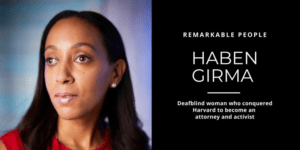Jack Blog
March 28th, 2023
 At Jack Morton, we’re wholeheartedly committed to inclusion and like many organizations aiming to improve diversity, equity, inclusion and belonging (DEIB), we’ve put much of our time and energy into efforts around race, gender and LGBTQIA2+ status. I feel optimistic about the changes we’ve made as an agency so far, but I know that it’s a journey and we still have a way to go.
At Jack Morton, we’re wholeheartedly committed to inclusion and like many organizations aiming to improve diversity, equity, inclusion and belonging (DEIB), we’ve put much of our time and energy into efforts around race, gender and LGBTQIA2+ status. I feel optimistic about the changes we’ve made as an agency so far, but I know that it’s a journey and we still have a way to go.
As we continue on that path in 2023, we’re paying closer attention to accessibility. It’s our aim to foster a work environment and culture that is accessible to all and ensure that the experiences we create are accessible. To kick start those efforts and create a learning opportunity for our people and network partners, we brought together IPG’s experiential group – Jack Morton, Momentum and Octagon – to hear from Haben Girma, the first deafblind person to graduate from Harvard Law School, in a session we called, “Intersectionality in Actioning Inclusion: A Fireside Chat with a Champion of Change.”
The fireside chat with Haben and our Chief People Officer, Natalie Ackerman, was an enriching discussion that highlighted how creating an environment that enables everyone to thrive continues to be the bedrock for a diverse, equitable, and inclusive future. In addition to sharing her personal experiences as a deafblind woman of color, Haben shared a tremendous amount of insight about what it takes to create accessible experiences. These five takeaways struck a chord with me, and I’ve been reflecting on them since:
1- “Part of accessibility is patience.”
We need to start by taking the time to understand the needs of disabled people. This means creating the space to be patient, to learn and engage with disabled people – asking about their experiences and what they need to participate fully in society. We also need to educate ourselves about the various types of disabilities and accommodations that can help people with those disabilities.
2- “If you’re not seeing our disabilities then you are not seeing all of us.”
As I was writing this, I consulted Haben because I wasn’t sure if I should use the term “disabled people” or “people with disabilities.” Haben shared that she, like many disabled activists prefers identity-first language (e.g., “disabled people”) rather than person-first language (e.g., “people with disabilities”). In her own words, “we say ‘Jewish students’, ‘male students’, ‘Indian students’, so why treat ‘students with disabilities’ differently? Traditionally, society told us to see the person and not the disability, giving rise to person-first language. That is still the norm, but many disabled advocates are pushing back. If you’re not seeing our disabilities, then you are not seeing all of us.”
3- “Equal access to information for all people – regardless of whether they’re sighted or hearing, deaf or blind – is essential.”
Society has made some progress in accessibility through assistive technology, like screen readers and audio descriptions that make it possible for blind people to use computers and smartphones and understand what’s happening in a video. When we don’t provide digital accessibility, we shut down this access. However, it’s not enough just to rely on advances in technology alone. We must be inclusive in every aspect of daily life.
4- “Disabilities don’t prevent people from accessing information, enjoying experiences, or thriving in society but ableism does.”
It starts with educating ourselves on the impact of language, stereotypes, and discrimination on disabled people. When we see ableist behavior, we have a responsibility to challenge it. In addition, we should aim to create environments that cater to the needs of disabled people.
5- “We must develop, design, and create with accessibility in the forefront.”
There is still a long way to go when it comes to making the world fully accessible. Many websites, apps, and physical environments are not designed with accessibility in mind, which makes it difficult or impossible for disabled people to use them. This can lead to exclusion and a sense of isolation for disabled people.
Whether it’s an experience, product, or service we should promote representation of disabled people and create with accessibility in mind. Accessibility is essential to building a more inclusive world. When we create inclusive experiences, we enable disabled people to participate. We all have a role to play in creating this world, and by working together, we can make it happen.